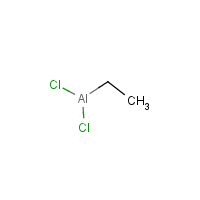Dichloroethylaluminum
Agent Name
Dichloroethylaluminum
CAS Number
563-43-9
Formula
C2-H5-Al-Cl2
Major Category
Metals

Synonyms
Aluminum, dichloroethyl-; Dichloromonoethylaluminum; Ethyl aluminum dichloride; Ethylaluminum dichloride; Ethyldichloroaluminum; [ChemIDplus] EADC; [HSDB] UN3051
Category
Metals, Organic Compounds
Description
Colorless liquid; [Sullivan, p. 979] Clear yellow liquid; mp = 31 deg C; [HDSB] Clear deep yellow liquid; mp = 32 deg C; [MSDSonline]
Sources/Uses
Used as a polymerization catalyst, for aromatic hydrogenation, and as an intermediate; [HSDB] Organic aluminum compounds are "some of the most important, highest volume, highest value organometallic compounds in production." [Ullmann]
Comments
Aluminum alkyl halides release large amounts of HCl when spilled in water; [ERG 2016] Ignites in air and reacts violently with water producing HCl and aluminum oxide; [Sullivan, p. 979] Reacts violently with water; May spontaneously ignite in air; A skin irritant; [HSDB] Highly flammable; Ignites on exposure to air; Reacts violently with water or moisture evolving hydrogen chloride and flammable ethane; Can cause severe burns to skin and eyes; [CAMEO] Pyrophoric; Reacts violently with water evolving extremely flammable gases; A corrosive substance that can cause injury to the skin, eyes, and respiratory tract; Inhalation may cause chemical pneumonitis and pulmonary edema; [MSDSonline] Organoaluminum compounds are corrosive; Harmful if absorbed through the skin or inhaled; The butyl alkyls and below are pyrophoric; Aluminum alkyls are eye irritants; [HSDB] Organic aluminum compounds can cause irritation or burns, depending upon concentration; [Ullmann] TLV withdrawn for aluminum alkyls because of inadequate toxicological data; [ACGIH] See "Aluminum." See "ORGANOMETALS."
Biomedical References
Exposure Assessment
TIH
Yes
Dangerous When Wet
Yes
Explanatory Notes
The Guide in the Emergency Response Guidebook is for "Aluminum alkyls." VP = 10 mm Hg at 80 deg C; [eChemPortal: HPVIS] Not TIH in land-based spills, but TiH substance released when spilled in water; [ERG 2016]
NFPA
burn readily
Adverse Effects
Toxic Pneumonitis
Yes
Dermatotoxin
Skin burns
Diseases, Processes, and Activities Linked to This Agent
Diseases
Occupational diseases associated with exposure to this agent:
Processes
Industrial Processes with risk of exposure: